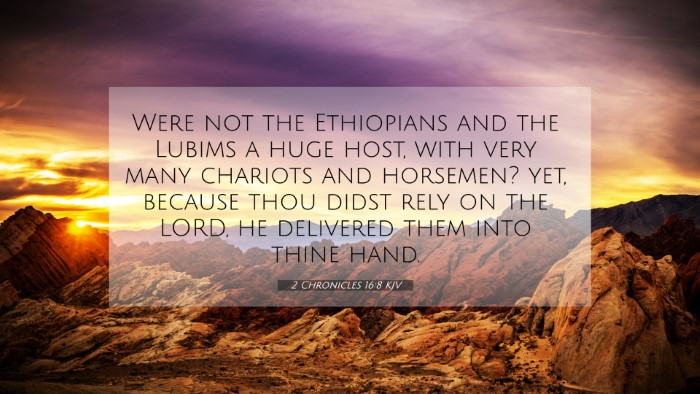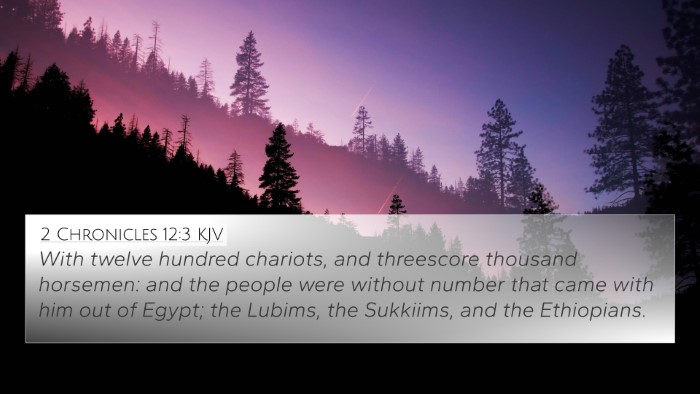Understanding 2 Chronicles 16:8
Verse: 2 Chronicles 16:8 states, "Were not the Ethiopians and the Lubims a huge host, with very many chariots and horsemen? Yet, because thou didst rely on the LORD, he delivered them into thine hand."
Summary of Insights
This verse highlights a critical moment in the life of King Asa of Judah, showcasing the importance of reliance on God in times of trouble. Asa's victory over a much larger army emphasizes the principle that faith and dependence on divine power surpass human strength and military might.
Commentary Insights
- Matthew Henry: Henry emphasizes Asa's reliance on God amidst military challenges. He points out that Asa sought help from God rather than forming alliances with foreign powers, illustrating the lesson of trusting in God's sovereignty.
- Albert Barnes: Barnes explains that this verse illustrates a moment in history where divine assistance is granted to those who faithfully depend on the Lord. He notes that Asa's faith was rewarded, leading to significant victories representing God's faithfulness.
- Adam Clarke: Clarke elaborates on the contexts of Asa's reign, noting that these victories serve as a testament to God's protective hand over those who trust Him. He highlights the miraculous nature of their victory over the overwhelming forces of Ethiopia and Libya.
Significance of the Verse
The significance of 2 Chronicles 16:8 lies in its demonstration of faith contrasted with human effort. It teaches that spiritual reliance can lead to extraordinary outcomes against formidable odds, which resonates deeply in both individual and communal faith journeys.
Related Bible Cross-References
- 2 Chronicles 14:11: Asa's cry for help during war reveals his dependence on God.
- Psalms 20:7: This verse supports the theme that some may trust in military strength while others place their trust in the Lord.
- Isaiah 31:1: This warns against relying on Egypt (symbolizing worldly strength) instead of God for deliverance.
- 1 Samuel 17:45-47: David's reliance on God when facing Goliath is a parallel to Asa's faith in God during battles.
- Hebrews 11:1: This New Testament verse defines faith, connecting it with Asa’s actions in seeking God’s help.
- Romans 8:31: This implies that if God is with us, who can stand against us, tying back to God’s deliverance of Asa.
- Proverbs 21:31: This emphasizes that the 'horse is prepared for the day of battle,' but victory belongs to the Lord.
- 1 Chronicles 12:18: The support Asa received can be viewed as evidence of God's provision when faith is present.
- 2 Chronicles 20:15: Jehoshaphat's reliance on God also serves as a continuity of faith in Judah's leadership.
- James 4:10: This encourages humility before the Lord, a trait evident in Asa’s reliance on God rather than self-sufficiency during crises.
Thematic Connections
The central theme connecting these verses is the reliance on God amidst trials. This theme is prevalent throughout the Bible, showcasing how faith in God results in divine intervention. Understanding the connections between these scriptures enhances our comprehension of God's promises and his actions throughout Biblical history.
Tools for Bible Cross-Referencing
For those looking to explore deeper, various tools can assist in Bible cross-referencing:
- Bible Concordance: An alphabetical listing of words and phrases found in the Bible, proving helpful in locating verses.
- Bible Cross-Reference Guide: A resource highlighting related verses for deeper study.
- Cross-Reference Bible Study: A method to connect thedots between scriptures for a fuller understanding of themes and teachings.
- Bible Reference Resources: Collections of cross-references and thematic studies available in various formats.
Conclusion
The exploration of 2 Chronicles 16:8 illuminates the profound truth that true strength comes from God. By relying on mechanisms of faith as evidenced throughout scripture, believers can find encouragement and courage amidst challenges. This understanding of inter-Biblical dialogue not only enhances personal faith but enriches communal worship and teaching.









